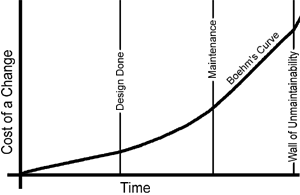I think this web page is very relevant to where we are right now as a dev team: http://www.agile-process.org/change.html (copied below with my emphasis)
(agile-process.org has many pages well worth the read - it's the sort of site you want to come back and read every 6 months)
I think the key here is that if we're going to be agile, our codebase needs to be agile... i.e. easy to change
This means:
- code is always refactored - the next person doesn't have to tidy it up before they can begin
- code is fully tested (unit and acceptance) - so the next person doesn't have doubts about whether it works or not, they can re-design with confidence knowing the tests have got their back... And so we don't have bugs lurking around in dark areas of the code - bring it into the light! Prove that it works!
- code follows conventions agreed on by the team - so the next person doesn't have to figure out why this code is different to the rest of the codebase
- there is no code duplication - we reuse code - rather than duplicating bugs / bad logic / unnecessary boilerplate code - we put it in one place so it can be easily changed
- code is simple - testable, understandable, browsable, explainable
Lots of good decisions in the small result in big payoffs in the large... lazy decisions in the small result in unmaintainable code... read on :)
Surprise! Software Rots!
Is software designed to be simple and elegant more valuable than software that is complex and hard to maintain? An Agile process accepts this as an important fact. |  error-free designs or pay a huge price later. That isn't what it means. Boehm's findings are not a condemnation of change but rather a caution tobe prepared when changes occur. A well run project keeps the cost of changes lower longer. | system. Early delivery of partial systems helps detect big changes before they become expensive. An Agile process accepts that requirements, analysis, and design are never truly done. An Agile process runs equally well in maintenance or development easing the transition. |